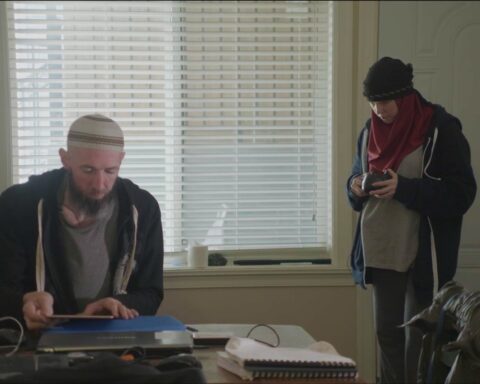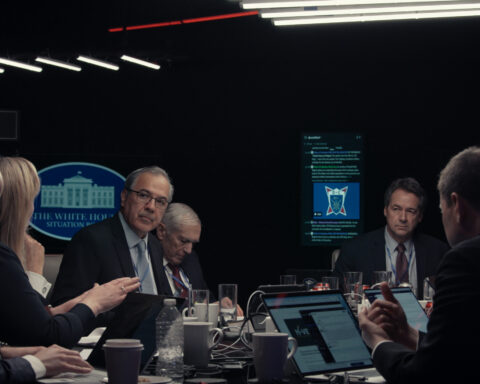The Final Year
(USA, 89 min.)
Dir. Greg Barker
Programme: TIFF Docs (World Premiere)
Sometimes with documentaries it is painfully obvious that the film that ends up in theatres is not the film the makers thought they were making. And The Final Year, Greg Barker’s new film about the last year of the Obama administration, is, for painfully obvious reasons, possibly the phenomenon’s epitome.
Barker’s focus is on the foreign policy team of Secretary of State John Kerry, Ambassador to the UN Samantha Power and Deputy National Security Advisor Ben Rhodes. He gets decent access to them, following the trio from Washington to missions abroad in Laos, Nigeria, Japan, Greenland and elsewhere. I don’t generally give a damn about films that have “humanizing” as their goal—I know people are people—but I have to admit that a few moments had me genuinely moved. Power, often ridiculed by the left as an interventionist hawk, comes off downright decent in meetings with the mothers of the girls kidnapped by Boko Haram, scenes with her kids and a citizenship-granting ceremony for, among others, her maid, wherein Power breaks down in tears remembering her own immigration from Ireland. Rhodes is definitely a bit of a jerk, but a smart one; his utter speechlessness on the evening of November 8, 2016, speaks volumes (and volumes, and volumes…). And Kerry—it’s easy to forget, given the very visible slings and arrows suffered in a life lived in public, but he’s basically a hero; when he says, again and again, that he’s an optimist, that he will never give up on a situation if he thinks there’s any chance of a solution, you believe him.
Barker’s access to the ex-president is significantly less impressive. His only interview with Obama, as far as I could tell, comes backstage at an event in Greece during his last trip abroad, and nothing very interesting comes up in it. There are other problems. For one, Barker’s access pretty clearly dried up after the election; he has Kerry saying that he wants to do everything he can to help the transition, to impress upon the newcomers the gravity of the job, but we never see Trump—or any Republican at all—enter the White House. Rhodes’ reaction said it all: it’s not even that nobody thought this was going to happen; nobody even thought about thinking about it. It was an absurdity, unthinkable. There was no contingency plan. And now all they achieved is subject to the whims of a dingbat.
Another problem is that details about specific situations are largely lost among the sheer number of foreign policy initiatives the administration was pursuing that year (extending, though the film doesn’t explicitly mention it, back to 2015), including the Paris Agreement, the Iran nuclear deal, the normalization of relations with Cuba, the Syria situation, the Russia situation. Any one of these could be a film unto itself; in The Final Year, they are packaged together as examples of Obama’s strategy of smart diplomacy in lieu of violence or other bombast.
A third issue hits at the heart of the problem I alluded to at the beginning. Barker obviously thought he was making a film about the nuances and multilateral compromises and complex personalities of post-Cold War, post-Iraq, 21st-century foreign policy. It was something that, in 2015, you could think was a perfectly good idea for a film, and which, by the end of the shitshow that was 2016, was revealed to be an absolute absurdity. Clearly, anyone making a film today about the end of the Obama administration would have to focus on the catastrophic election and the oft-made argument that Obama’s inability to communicate his achievements to the American people was one of the things that doomed Democrats in elections throughout his two terms. The closest the film gets to this comes in an argument between Obama, Power and Rhodes about the state of the world. Obama has it that things are better now than ever before; Power says to tell that to the 65 million people currently displaced worldwide—the most since WWII. Those positions map pretty well onto the images of the US that were bandied about throughout the election by Clinton and Trump, respectively. We know which one people found more convincing.
The film ends with Rhodes noting several small things achieved by the Obama administration—the speech at Hiroshima, visiting Laos and acknowledging Nixon’s secret war there, his habit of advising and inspiring young leaders around the world—which Rhodes counts as possibly the administration’s true victories. But the fact is that we don’t know what the administration’s achievements will be, what will escape the disruption being created by the Trump administration and the chaos currently gripping much of the world. This is the problem with making a film about a presidency: its causes may lie decades in the past and its effects will reach decades into the future. The Final Year, for all its merits, is far from the final word about the end of the Obama administration.











